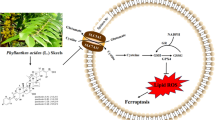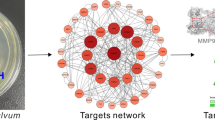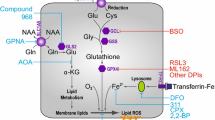Summary
Vitamin K3, also known as menadione, is a synthetic lipid-soluble 2-methyl-1,4- naphthoquinone analogs of vitamin K. The vitamin K derivatives exhibit potent cytotoxicity against several cancer cell lines through ROS induction and mitochondrial dysfunction. We investigated vitamin K3-inspired derivatives as potential apoptotic inducers and analyzed their mechanisms beyond apoptosis. The cytotoxicity of a panel of vitamin K3 analogs was screened against 10 doxorubicin-sensitive and -resistant cancer cell lines overexpressing ATP-binding cassette transporters (P-glycoprotein, ABCB5, BCRP) or oncogenes (ΔEGFR) or with knockout of tumor suppressors (p53), Cell cycle arrest, apoptosis, cell migration, and microtubule formation were further investigated. The online tool SwissTargetPrediction was utilized for target prediction. Among the screened compounds, one vitamin K3 thio-derivative (No. 45, VKT-1) exhibited the most potent cytotoxicity specifically against both drug-sensitive and -resistant cancer cell lines. In addition, VKT-1 arrested the cells at the G2/M phase and induced apoptosis as detected by flow cytometry. As predicted by SwissTargetPrediction, VKT-1 targeted microtubule-associated tau protein. Indeed, VKT-1 dramatically inhibited cell migration and microtubule formation in vitro. In conclusion, the synthetic vitamin K3 thio-derivative (VKT-1) inhibited doxorubicin-sensitive and -resistant tumor cells by cell arrest, apoptosis induction, as well as, migration inhibition, and microtubule deterioration of U2OS-GFP-α-tubulin cells.









Similar content being viewed by others
Abbreviations
- DMSO:
-
Dimethyl sulfoxide
- FBS:
-
Fetal bovine serum
- FITC:
-
Fluorescein isothiocyanate
- DMEM:
-
Dulbecco’s modified Eagle’s medium
- RPMI-1640:
-
Roswell Park Memorial Institute medium; fluorescein isothiocyanate
- ELISA:
-
Enzyme−linked immunosorbent assay
- IC50 :
-
50% inhibition concentration
- MDR:
-
Multidrug resistance
- PBS:
-
Phosphate buffer saline
- PI:
-
Propidium iodide
- RNase A:
-
Ribonuclease A from bovine pancreas
References
Nikolaou M, Pavlopoulou A, Georgakilas AG, Kyrodimos E (2018) The challenge of drug resistance in cancer treatment: a current overview. Clin Exp Metastasis 35(4):309–318
Barbuti AM, Zhang G-N, Gupta P, Narayanan S, Chen Z-S (2019) EGFR and HER2 inhibitors as sensitizing agents for Cancer chemotherapy. In: Protein kinase inhibitors as sensitizing agents for chemotherapy. Academic Press, Cambridge, pp 1–11
Gillet J-P, Efferth T, Remacle J (2007) Chemotherapy-induced resistance by ATP-binding cassette transporter genes. BBA-REV CANCER 1775(2):237–262
Robey RW, Pluchino KM, Hall MD, Fojo AT, Bates SE, Gottesman MM (2018) Revisiting the role of ABC transporters in multidrug-resistant cancer. Nat Rev Cancer:18(7)452–464
DiNicolantonio JJ, Bhutani J, O'Keefe JH (2015) The health benefits of vitamin K. Open Heart 2(1):e000300. https://doi.org/10.1136/openhrt-2015-000300
Josey BJ, Inks ES, Wen X, Chou CJ (2013) Structure-activity relationship study of vitamin k derivatives yields highly potent neuroprotective agents. J Med Chem 56(3):1007–1022. https://doi.org/10.1021/jm301485d
Koyano H, Someya A, Nagaoka I, Yamashita T (1988) Effect of vitamin K3 on macrophage functions and intracellular calcium. Comp Biochem Physiol A Comp Physiol 91(1):115–121
Schwalfenberg GK (2017) Vitamins K1 and K2: the emerging Group of Vitamins Required for human health. J Nutr Metab 2017:6254836. https://doi.org/10.1155/2017/6254836
Akbari S, Rasouli-Ghahroudi AA (2018) Vitamin K and bone metabolism: a review of the latest evidence in preclinical studies. Biomed Res Int 2018:4629383. https://doi.org/10.1155/2018/4629383
van Ballegooijen AJ, Beulens JW (2017) The role of vitamin K status in cardiovascular health: evidence from observational and clinical studies. Curr Nutr Rep 6(3):197–205. https://doi.org/10.1007/s13668-017-0208-8
Anwar F, Khan R, Sachan R, Kazmi I, Rawat A, Sabih A, Singh R, Afzal M, Ahmad A, Al-Orab AS (2018) Therapeutic role of calcium and vitamin K3 in chemically induced hepatocarcinogenesis–new tools for cancer treatment. Arch Physiol Biochem:1–6
Bonilla-Porras AR, Jimenez-Del-Rio M, Velez-Pardo C (2011) Vitamin K3 and vitamin C alone or in combination induced apoptosis in leukemia cells by a similar oxidative stress signalling mechanism. Cancer Cell Int 11:19. https://doi.org/10.1186/1475-2867-11-19
Chen J, Hu X, Cui J (2018) Shikonin, vitamin K3 and vitamin K5 inhibit multiple glycolytic enzymes in MCF-7 cells. Oncol Lett 15(5):7423–7432. https://doi.org/10.3892/ol.2018.8251
Huang J, Lu Z, Xiao Y, He B, Pan C, Zhou X, Xu N, Liu X (2018) Inhibition of Siah2 ubiquitin ligase by vitamin K3 attenuates chronic myeloid leukemia chemo-resistance in hypoxic microenvironment. Med Sci Monit 24:727–735
Ivanova D, Zhelev Z, Getsov P, Nikolova B, Aoki I, Higashi T, Bakalova R (2018) Vitamin K: redox-modulation, prevention of mitochondrial dysfunction and anticancer effect. Redox Biol 16:352–358. https://doi.org/10.1016/j.redox.2018.03.013
Nakaoka E, Tanaka S, Onda K, Sugiyama K, Hirano T (2015) Effects of vitamin K3 and K5 on Daunorubicin-resistant human T Lymphoblastoid leukemia cells. Anticancer Res 35(11):6041–6048
Scott GK, Atsriku C, Kaminker P, Held J, Gibson B, Baldwin MA, Benz CC (2005) Vitamin K3 (menadione)-induced oncosis associated with keratin 8 phosphorylation and histone H3 arylation. Mol Pharmacol 68(3):606–615. https://doi.org/10.1124/mol.105.013474
Teixeira J, Amorim R, Santos K, Soares P, Datta S, Cortopassi GA, Serafim TL, Sardão VA, Garrido J, Borges F (2018) Disruption of mitochondrial function as mechanism for anti-cancer activity of a novel mitochondriotropic menadione derivative. Toxicology 393:123–139
Fukaya M, Nakamura S, Hegazy MEF, Sugimoto Y, Hayashi N, Nakashima S, Yoshikawa M, Efferth T, Matsuda H (2018) Cytotoxicity of sesquiterpene alkaloids from Nuphar plants toward sensitive and drug-resistant cell lines. Food Funct 9(12):6279–6286
Hegazy M-EF, Hamed AR, El-Halawany AM, Hussien TA, Abdelfatah S, Ohta S, Paré PW, Abdel-Sattar E, Efferth T (2018) Cytotoxicity of abietane diterpenoids from Salvia multicaulis towards multidrug-resistant cancer cells. Fitoterapia 130:54–60
Mbaveng AT, Ndontsa BL, Kuete V, Nguekeu YM, Çelik İ, Mbouangouere R, Tane P, Efferth T (2018) A naturally occuring triterpene saponin ardisiacrispin B displayed cytotoxic effects in multi-factorial drug resistant cancer cells via ferroptotic and apoptotic cell death. Phytomedicine 43:78–85
Seo E-J, Sugimoto Y, Greten HJ, Efferth T (2018) Repurposing of bromocriptine for cancer therapy. Front Pharmacol 9
Gfeller D, Grosdidier A, Wirth M, Daina A, Michielin O, Zoete V (2014) SwissTargetPrediction: a web server for target prediction of bioactive small molecules. Nucleic Acids Res 42(W1):W32–W38
Seo E-J, Wu C-F, Ali Z, Wang Y-H, Khan SI, Walker LA, Khan IA, Efferth T (2016) Both phenolic and non-phenolic green tea fractions inhibit migration of cancer cells. Front Pharmacol 7:398
Ivanova D, Zhelev Z, Lazarova D, Getsov P, Bakalova R, Aoki I (2018) Vitamins C and K3: a powerful redox system for sensitizing leukemia lymphocytes to Everolimus and Barasertib. Anticancer Res 38(3):1407–1414. https://doi.org/10.21873/anticanres.12364
Jinghe X, Mizuta T, Ozaki I (2015) Vitamin K and hepatocellular carcinoma: the basic and clinic. World J Clin Cases 3(9):757–764. https://doi.org/10.12998/wjcc.v3.i9.757
Lamson DW, Plaza SM (2003) The anticancer effects of vitamin K. Altern Med Rev 8(3):303–318
Fujii S, Kagechika H (2017) Medicinal chemistry of vitamin K derivatives and metabolites. In: vitamin K2-vital for health and wellbeing. IntechOpen
Yang H, Ganguly A, Cabral F (2010) Inhibition of cell migration and cell division correlates with distinct effects of microtubule inhibiting drugs. J Biol Chem 285(42):32242–32250
Acknowledgments
Prof. Mohamed Hegazy gratefully acknowledges the financial support from Alexander von Humboldt Foundation “Georg Foster Research Fellowship for Experienced Researcher” and Ge Yan thanks the support from China Scholarship Council (CSC). We are thankful for the Ph.D. stipend provided to Mona Dawood by the Ministry of Higher Education and Scientific Research as well as the Al-Neelain University, Khartoum, Sudan.
Funding
This research was partially funded by the Alexander von Humboldt Foundation awarded to MEFH.
Author information
Authors and Affiliations
Corresponding author
Ethics declarations
Conflict of interest
Mohamed-Elamir F. Hegazy declares that he has no conflict of interest.
Masashi Fukaya declares that he has no conflict of interest.
Mona Dawood declares that she has no conflict of interest.
Ge Yan declares that she has no conflict of interest.
Anette Klinger declares that she has no conflict of interest.
Edmond Fleischer declares that he has no conflict of interest.
Asmaa W. Zaglool declares that she has no conflict of interest.
Thomas Efferth declares that he has no conflict of interest.
Ethical approval
This article does not contain any studies with human participants or animals performed by any of the authors.
Informed consent
For this type of study, formal consent is not required.
Additional information
Publisher’s note
Springer Nature remains neutral with regard to jurisdictional claims in published maps and institutional affiliations.
Rights and permissions
About this article
Cite this article
Hegazy, ME.F., Fukaya, M., Dawood, M. et al. Vitamin K3 thio-derivative: a novel specific apoptotic inducer in the doxorubicin-sensitive and -resistant cancer cells. Invest New Drugs 38, 650–661 (2020). https://doi.org/10.1007/s10637-019-00810-7
Received:
Accepted:
Published:
Issue Date:
DOI: https://doi.org/10.1007/s10637-019-00810-7




